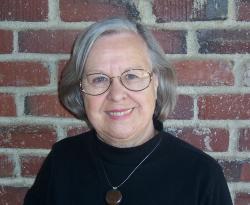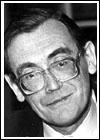Planning worship?
Check out our sister site, ZeteoSearch.org,
for 20+ additional resources related to your search.
- |
User Links
Person Results
Jean Janzen

b. 1933 Author of "I Cannot Dance, O Love" in Chalice Hymnal Jean Janzen was born on December 5, 1933, the seventh of Henry Peter Wiebe and Anna Schultz Wiebe's eventual eight children (Three Mennonite Poets 5). For the first five years of her life, Janzen lived in Dalmeny, Saskatchewan (A Cappella 25). In 1938, she moved to Mountain Lake, Minnesota when her schoolteacher father began his second ministry as a pastor (“Coming into Voice”). A year later, the family moved to Kansas (“Coming into Voice”).
Janzen says she cannot remember when she wrote her first poem, but the first evidence of her work is a handwritten book of five poems that she made in third or fourth grade, which was saved by her mother through the family’s many moves (E-mail Interview). She had very little exposure to poetry and literature as a child, except for hymns and Bible stories. She values these elements of her childhood and “treasure[s] the artful rhythms of the King James [Bible]” (E-mail Interview).
Janzen attended Meade Bible Academy, Tabor College, and Grace College (A Cappella 25). It was in college that she had her first real exposure to literature. She was “thrilled, and became a literature major.” She remembers being “enamored” with Emily Dickinson and writing papers about her whenever given the chance. However, she never considered writing poetry as a possible career (E-mail Interview).
Janzen--then Jean Wiebe--married Louis Janzen, a medical student, and the couple moved to Chicago where she worked as a medical secretary while taking courses at Northwestern University (Hostetler, A Cappella 25). Janzen cites this period of her life as the beginning of her love for visual art, calling the Chicago Art Institute the “open gate” for her and her husband where they “became hooked” (Mennonite Life Interview). In 1961, they moved to Fresno, Cal., where Louis worked as a pediatrician in a private practice. Here they raised their two daughters and two sons.
When her youngest child was in school, Janzen “joined a writer’s group at the encouragement of [her] husband and nephew after they read some poems [she] had written as a gift to [her] husband” (E-mail Interview). As her children became older, Janzen went back to college, earning a BA in English from Fresno Pacific College and an MA in Creative Writing and English from California State University at Fresno in 1982. There she studied with poets Peter Everwine, Philip Levine, and C.G. Hanzlicek. Janzen says that after one semester of writing poetry in college, she took the work “seriously” and “imagined the possibility of growing into a poet,” but it took her several years “to be willing to say that out loud” (E-mail Interview).
Rudy Wiebe, a Mennonite novelist, served as a mentor who influenced Janzen's writing career. She received a grant from the National Endowment for the Arts in 1995 (“Coming into Voice”). Janzen grew up in the Evangelical Mennonite Brethren Church and many of her relatives, including her father, were pastors (“Coming into Voice”). This strong connection with the church has had a significant influence on her poetry.
Music has also played an important role in Janzen’s life. Her mother loved music and music was an important part of worship in her church. She learned to play the piano when she was young, later studying music in college and teaching piano for many years (“Coming into Voice”). Janzen finds harmony between the religious and artistic elements of her life, integrating them in a way that enriches both. She also uses her gifts in the church, serving as a minister of worship at the College Community Mennonite Brethren Church in Clovis, Cal., as well as writing hymn texts, which have been set to music and are included in several hymn books.
Other prominent themes in her work include art, history, family, the earth, and her Russian Mennonite ancestors (“Coming into Voice”). Janzen says that “the sensual and spiritual are inevitably intertwined” (Mennonite Life Interview) and it is this element of her work that has attracted the most attention from critics and readers. She emphasizes “the presence of spirit in the flesh,” using rich description of physical objects to reveal deeper emotions and truths. Janzen has taught poetry writing at Fresno Pacific University and Eastern Mennonite University in Virginia.
--www.goshen.edu/mennonitepoetry/
Jean Janzen
Colin Gibson

b. 1933 Composer of "MECHTILDE" in Hope is our Song Colin Gibson (b. 1933) was born in Dunedin, the south island of New Zealand. He has been writing hymn texts and hymn settings for over 20 years. His works have been published and performed in Africa, the United States, Asia and Australasia, Great Britain and Europe. He is organist and director of the Mornington Methodist Choir, Dunedin, New Zealand, a lay preacher, and retired in 1999 as Head of the Department and Donald Collie Professor of English at the University of Otago where he currently heads the Department of Theatre Studies and continues to lecture on English Literature as Emeritus Professor. He has conducted numerous hymn workshops in New Zealand, Australia and Great Britain, and has been co-editor of a number of hymn collections. His frequent collaboration with Shirley Erena Murray is represented in several Hope publications, and he has his own published collections of hymns: Singing Love (Collins) and more recently Reading the Signature (Hope, 1994 - Code #1753) and Songs for a Rainbow People (Hope, 1998 - Code #8005). Three of his hymns are included in the Hope hymnal Worship & Rejoice (2001).
--www.hopepublishing.com
Colin Gibson
Mechthild, of Magdeburg
1212 - 1282 Person Name: Mechtild of Magdeburg Based on the writing of of "I cannot dance, O Love" in Hymnal Mechthild of Helfta, or Mathilde in modern spelling, was a mystic author who lived in the Cisterian nunnery at Helfta near Eisleben, Germany. She is also known as Mechthild of Hackeborn, her parents' home. She was a younger sister of St. Gerturde of Hackeborn. She is mentioned in Bocaccio's Decameron, VII, 1, and in canto 28 of Dante's Purgatory. Cf. "Liber specialis gratiae" in Revelations Gertrudianae ac Mechtildianae (1877).
Her "Liber specialis gratiae" was popular in England and was translated into English in the fifteenth century. More recently it has been edited by Theresa A. Halligan as The Booke of Gostlye Grace of Mechtild of Hackeborn (Toronto: Pontifical Institute of Mediaeval Studies, 1979).
--Leonard Ellinwood, DNAH Archives
Mechthild, of Magdeburg
LaRhae Knatterud
Person Name: Lahrae Knatterud Harmonizer of "BRED DÌNA VIDA VINGAR" in Chalice Hymnal
LaRhae Knatterud


 My Starred Hymns
My Starred Hymns


